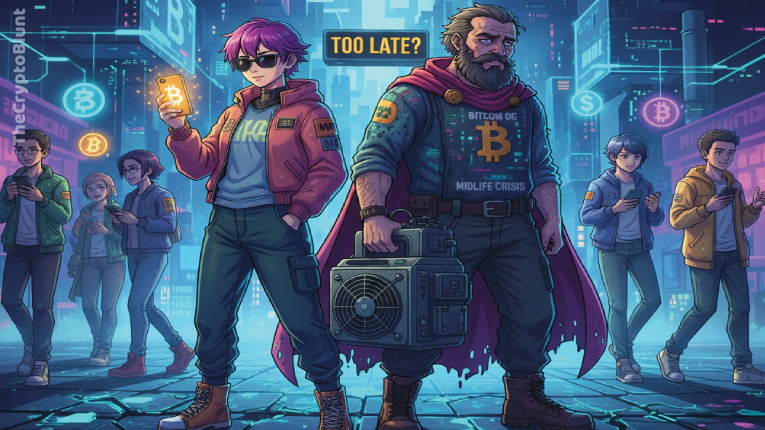A new fundamental peril is confronted by Bitcoin; not originating from Washington, Beijing, or sophisticated computing systems, but represented by the risk of generational indifference.
- From Early Outsider to Institutional Favorite
- Tracking the Long History of Bitcoin Obituaries
- Gen-Z Faces Cash Constraints and Limited Bitcoin Exposure
- The Political Divide in Crypto Ownership
- Why Bitcoin’s Core Philosophy Struggles to Gain Traction
- Demographic Challenge or Demographic Opportunity?
- Closing the Divide Between Bitcoin and Youth Culture
You are invited to Slate Sunday, regular segment exhibiting comprehensive conversations, expert assessments, and stimulating editorials that delve past the headlines to examine the concepts and voices influencing the future of crypto.
Bitcoin commenced its existence as an absolute novice. It did not originate from Silicon Valley innovation or the executive suites of central banks. Instead, Bitcoin’s inception in the aftermath of the Great Financial Crisis was both impeccably scheduled and fundamentally disruptive.
A whitepaper disseminated to a cypherpunk mailing list by the enigmatic Satoshi Nakamoto proposed a peer-to-peer payment network that could circumvent the impaired apparatus of post-$2008 finance.
Bitcoin represented “F-you money,” a direct opposition to bailouts, bank insolvencies, and central management. Early proponents perceived themselves as digital dissenters, constructing the infrastructure for a new form of unrestricted currency. It was uncensored, borderless, and detached from the caprice of officials and the deficiencies of superannuated establishments. Satoshi disseminated on January $17, 2009:
“It might make sense just to get some in case it catches on. If enough people think the same way, that becomes a self fulfilling prophecy.”
From Early Outsider to Institutional Favorite
Within fifteen years, Bitcoin transitioned from a scholarly whitepaper to a global monetary network appraised at over $2 trillion dollars. Regulatory endorsement, once the most distant prospect, finally became evident; first with prudent suggestions, then with prominent sanction. U.S. Treasury Secretary Scott Bessant commented on the anniversary of Bitcoin’s genesis:
“17 years after the white paper, the Bitcoin network is still operational and more resilient than ever. Bitcoin never shuts down.”
With each major achievement — spot ETF launches, billions being allotted by Wall Street, bills being approved by Washington, or Bitcoin retained on public company balance sheets — every obstacle appeared conquered by the original dissident.
But with acceptance comes a more sluggishly advancing peril: pertinence. The technologies that perturb the world subsist only as long as their narratives are compelling. And it is apparent that the next generation is not persuaded.
Tracking the Long History of Bitcoin Obituaries
To compose Bitcoin’s eulogy has evolved into a wearisome style (if not an entire trade). Whether it was the vagueness of early code, Mt. Gox’s disastrous infiltration, China’s mining prohibition, regulatory severe impacts, or the apparition of quantum computing, in excess of 450 headlines have been documented proclaiming Bitcoin extinct.
“I’ve always been completely opposed to crypto, Bitcoin, etc. The only true use case for it is criminals, drug traffickers… money laundering, tax avoidance… If I was the government, I’d close it down.”
Warren Buffett, “Oracle of Omaha,” called it “rat poison squared.” Jamie Dimon jibed:
Yet each crisis appears to fortify Bitcoin’s defenses. After every regulatory alarm, security failure, or bear market, the network endures, blocks persist in advancing, and a new narrative has been conceived: Bitcoin cannot be halted.
“Bitcoin, who can ban it? Nobody. And who can prohibit the use of other electronic payment instruments? Nobody, because these are new technologies.”
That belief has become so pervasive that even the likes of Russian President Vladimir Putin have repeated it on record:
It is certain that Bitcoin has developed into the spiritual heir to gold for the digital millennial demographic: anti-delicate, and (if endurance is significant) everlasting.
But as was previously conveyed to by Casa CSO and Bitcoin security specialist Jameson Lopp, the most significant peril to Bitcoin is not constituted by technological wizardry or regulatory contests. In $2025, it is sheer indifference: an inadequate number of young people are engaged.
Gen-Z Faces Cash Constraints and Limited Bitcoin Exposure
‘Zoomers’, the demographic introduced to iPhones and Instagram, reared on YouTube and TikTok, and attaining adulthood amidst weariness from “late capitalism,” are currently altering the economic strategy.
The typical Gen-Z graduate is confronted with unchanging remuneration, distant likelihoods of securing a mortgage, vanishing entry-level jobs, and new levels of credit card liabilities. When “the future” is not perceptible past the next paycheck, why should value be accrued for tomorrow? As was communicated to by Sean Ristau, VP of Digital Assets at InvestiFi:
“Bitcoin began as a direct challenge to the financial system, a form of protest. Now it more resembles digital gold, primarily controlled by whales and banks. For young people dealing with inflation, debt, and rising costs, that image doesn’t connect.”
Bitcoin, despite all its market bravado, is perceived as questionably antiquated by a substantial portion of Gen-Z. Its earliest advocates bear the battle injuries of $2008, while Zoomers have only experienced meme stocks, Robinhood options, and dog tokens.
A warning is issued by CIO of ProCap BTC and Bitwise advisor Jeff Park that Bitcoin’s narrative is required to be modified. Gen-Z desires significance, he contends, not inflation protection, and:
“In the end the whole Bitcoin thesis breaks if the young don’t buy.”
“It’s actually a massive problem that Gen-Z doesn’t have enough interest in Bitcoin because they’re too nihilistic. We have to continue to reach out and try and shake them awake, and be like, “Dude, do something now before it’s too late!” from a self-preservation standpoint and for their own good. It’s both things.”
Discussing the same issue on a recent What Bitcoin Did podcast, American HODL acknowledged:
The Political Divide in Crypto Ownership
Partisan disparities surrounding Bitcoin have also never been more pronounced. When the Biden administration intensified Choke Point 2.0 against crypto firms, the party line was established as “crypto is detrimental, oversight is beneficial.”
In contrast, embracing Bitcoin is now viewed by MAGA Republicans, libertarian loyalists, and some moderate centrists as a method to demonstrate backing for fiscal autonomy and national revitalization.
But Zoomers are becoming disengaged. Online communities, where unity surpasses volatile trading, have been sought out by them. The politics of Bitcoin, once presented as freedom from governments, now contend against rising tides of economic apprehension and pervasive suspicion not just in DC, but in anything institutional. Park cautioned:
“There is a reason the socialist candidates are not embracing Bitcoin in elections – it’s not because they are afraid of “the establishment,” they have come to the conclusion it hurts them. This is unequivocally bad. Bitcoin and Mamdani has to be the same platform for Bitcoin to win, not Bitcoin and Ackman.”
While Trump and an expanding contingent of Republican voices endorse Bitcoin as patriot tech, left-of-center Gen-Zers are moving toward socialist agitators such as Zohran Mamdani. Bitcoin is portrayed as a libertarian pursuit (or worse), a portion of the uninspired establishment. Either way, a significant divergence from the streetwise insurgent it was previously recognized as.
Why Bitcoin’s Core Philosophy Struggles to Gain Traction
Bitcoin’s original proposal of liberation from banks, inflation-resistant savings, and digital permanence does not ignite substantial enthusiasm among young people. For them, currency is less characterized as a fortress to safeguard and more as a set of values in an endless game: perpetually in play and incessantly circulating. It was communicated by CMO of Bitget Wallet, Jamie Elkaleh:
“Gen Z’s investment culture is faster, social, and memetic. They gravitate toward community-driven tokens, AI-linked assets, and creator economies because these feel participatory and align with their digital behaviors.
Younger users frequently perceive Bitcoin as an instrument for funds and holdings instead of a platform where they can become involved directly… Bitcoin’s narrative as “digital gold” furnishes security and distinction but is devoid of the interactive, goal-oriented vitality that shapes this generation’s involvement with finance.”
“Crypto ownership is growing fast (more than half of Gen Z has owned digital assets at some point), but Bitcoin’s audience still skews older, wealthier, and mostly male. Younger users are chasing very different things: memecoins with a purpose, AI-linked tokens, and social or gaming projects that feel fun, useful, or community-driven. So why the disconnect?”
Ristau added:
Demographic Challenge or Demographic Opportunity?
It is unsurprising that young people under $25 are progressively becoming disaffected with the world and their standing within it. High inflation, unattainable wealth-building, and absolute doubt in the institutions their parents placed their reliance upon.
It is possible that this struggle could precipitate the next wave of embrace, paradoxically. It was communicated by Grant Cardone, CEO of Cardone Capital:
“There’s no ‘youth dilemma’ in Bitcoin. The real problem isn’t the age of the holders; it’s the mindset. Gen-Z has been told to trade memes instead of build wealth. They’re chasing fast money instead of legacy money. Bitcoin was built for people who think long-term, who understand that control, scarcity, and freedom are the foundation of wealth.”
In this circumstance, Bitcoin’s alleged “demographic problem” is transformed into more of a demographic potential. A new wave, spearheaded by a generation prepared to assert digital ownership. As was stressed by Elkaleh:
“Bitcoin’s youth dilemma stems from a widening gap between its institutional maturity and its cultural relevance. Ownership among younger investors hasn’t vanished, but their first touchpoint increasingly comes from culture-linked assets, not BTC. While institutions and ETFs have strengthened Bitcoin’s credibility, they’ve also shifted its center of gravity away from grassroots, online-native communities.”
Closing the Divide Between Bitcoin and Youth Culture
So, how is Bitcoin to transcend its aging investor base and draw in the creators, gamers, and digital entrepreneurs of Gen-Z? The answer is constituted by utility, trust, and culture. Cardone expressed it plainly:
“Bitcoin doesn’t need to ‘change’ for Gen Z; Gen Z needs to wake up to Bitcoin. But I’ll tell you what will make it more appealing: education, empowerment, and experience.”
It is believed by Ristau that the focus ought to be placed more on Bitcoin’s utility and expanding global applications. This is highlighted by him:
“Inflation hedge, financial freedom, and lower global remittance costs are essential considerations. Crypto remittances have increased by more than 400% in recent years. That story should be front and center.”
Emphasis is reiterated by Elkaleh on the necessity to revitalize Bitcoin’s message and ensure it is centered firmly on utility as well:
“Equally important is a narrative refresh. The “digital gold” framing resonates with institutions and long-term investors but fails to explain Bitcoin’s human utility. For younger users, Bitcoin’s relevance comes from what it enables—privacy, self-custody, censorship resistance, and cause-driven transactions. Tying these principles to tangible experiences, such as remittances or community donations, can make Bitcoin meaningful beyond price.”
Bitcoin has withstood more fundamental perils than any digital innovation, persisting beyond the dark prognostications of deterioration from Wall Street’s moguls to the regulatory halls of power. But the most significant risk may be posed by forfeiting the vitality of youth: the rebels, dreamers, and builders by whom Bitcoin was imparted its soul.
Whether Bitcoin is transformed into a museum piece or world-changing currency will be determined, as always, by those who are sufficiently invested to continue the mission.
Ultimately, the perpetuation of “freedom money” is reliant upon altering the narrative from heritage to a story of meaning. Bitcoin was never intended to be tedious. And to flourish into the next decade and beyond, it is necessary for it to be perceived as vital, not merely valuable.
















